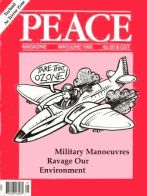
Peace Magazine May-Jun 1992, page 12. Some rights reserved.
Search for other articles by Brian Masse here
Last November 12, Indonesian soldiers fired on a civilian demonstration in East Timor, killing or wounding more than one hundred persons. The protesters were calling for independence for their island territory, which the Indonesians seized by force in 1975. During and after this bloody seizure Canada, the largest single investor in Indonesia, turned a blind eye. Indeed, despite strong human rights guidelines governing its aid agencies, Canada continued and increased its aid programs as Indonesia killed 200,900 East Timorese. But now the widely publicized killing of nearly one hundred civilians has Canada's Secretary of State for External Affairs, Barbara McDougall, deploring the "shocking turn of events" and announcing plans to review foreign aid to Indonesia. Is Canada finally ready to follow its own guidelines?
The Canadian "Exports Control Policy" is supposed to monitor nations receiving Canadian aid in the form of trade and investment. For example, Canadian military goods are not to be exported to governments that persistently violate the human rights of their citizens. Barbara McDougall's promised review is good news for East Timor, but historically, such promises by Canadian officials have only amounted to rhetoric. In a 1988 speech to a human rights conference, the then External Affairs Minister Joe Clark stated that "the first responsibility of policy-makers has always been to protect and promote national interests, and to conduct relations with countries accordingly. But if the 20th century has taught us anything, it is that the single-minded pursuit of one's own political or economic advantage is a formula for disaster."
Mr. Clark's policy stipulates that governments receiving military and technological exports from Canada must not pose a threat to Canada or its allies, be involved in or under imminent threat of hostilities, be under United Nations Security Council sanctions, or have a record of serious human rights violations (unless it can be demonstrated that these exports would not be used against civilian populations.)
Canada followed these guidelines with Indonesia as long as it was ruled by socialist leaning governments unaffiliated with Canada's business interests. In 1964, for example, Canada halted food aid in protest over Indonesia's confrontation with Malaysia. But in 1%5 General Suharto staged a successful coup and immediately proceeded to purge Indonesia of "communist" elements, killing more than a hundred thousand individuals. Because the political and economic leaning of Suharto was pro-Western, Canada did not suspend aid again but instead increased it.
Barely six months after General Suharto began his infamous invasion of East Timor, Canada again contradicted its guidelines and increased aid, this time by $200 million.
The invasion of East Timor violates basic tenets of the United Nations, including the respect for territorial boundaries and the universal right of self-determination. On December 12, 1975, the United Nations General Assembly passed a motion deploring the Indonesian assault on East Timor. Ten days later, the U.N. Security Council demanded that Indonesia remove its armed forces from East Timor.
The Indonesian assault on East Timor clearly violates Canada's own criteria for foreign aid. First, Indonesia has been involved in hostilities against a nationalistic movement called FRETILIN (Revolutionary Front for an Independent East Timor) which continues guerilla warfare up to this day. Second, the criterion that no country will receive military or technological goods while under United Nations Security Council sanctions escapes only under a technicality. Although the Security Council has not applied sanctions, it has called for the removal of Indonesian armed forces from East Timor. Third, Indonesia has a persistent record of human rights violation against its civilians. If Canada were to acknowledge East Timor as an independent state, then Indonesia would be involved in hostilities against a sovereign nation. Following Canada's present position that the invasion of East Timor is a"fait accompli," Indonesia is violating the human rights of its own civilians.
Compounding this hypocrisy is the sale of military goods from Canadian manufacturers to Indonesia. These materials, which include air navigation equipment and body armor for security forces have, in all likelihood, been used in the violence. Adding insult to injury, in 1985 the Canadian government sponsored a military trade fair in Jakarta which showcased the Canadian weapons makers.
But Western governments consider Indonesia a local superpower in the Asia-Pacific region and are confident in its ability to provide a stable environment for economic investment. The Canadian International Development Agency (CIDA) believes that "there will be a shift of the world's industrial and technological power to the Pacific rim area by the year 2000." This is why Canada has continued to provide aid to one of the worst human rights violations of this century.
When Barbara McDougall reviews our aid to Indonesia she should review the history of Canadian linkage to the genocide of East Timor. Canada must withhold aid from Indonesia and prohibit any trade that is detrimental to the citizens of East Timor. Otherwise McDougall will once more confirm that Canada only spews rhetoric of human rights, but conducts foreign policy according to cold-blooded, amoral calculations.
Brian Masse is a support worker with the Community Vocational Services of Mississauga.

Peace Magazine May-Jun 1992, page 12. Some rights reserved.
Search for other articles by Brian Masse here